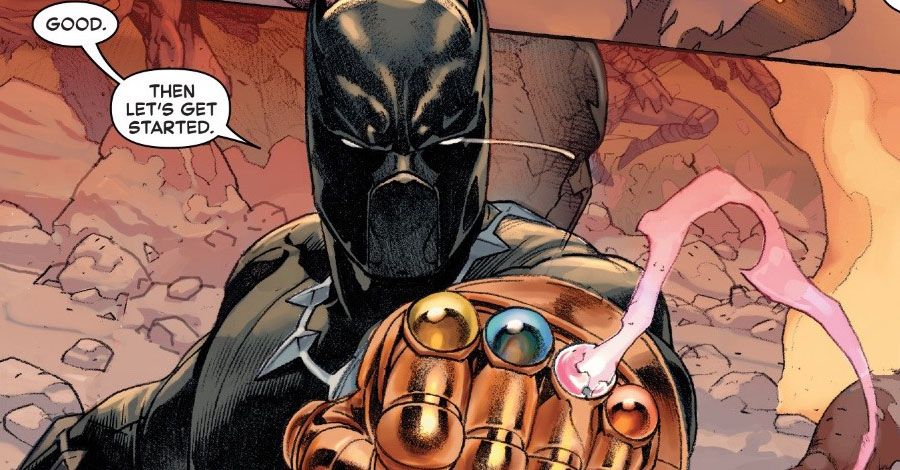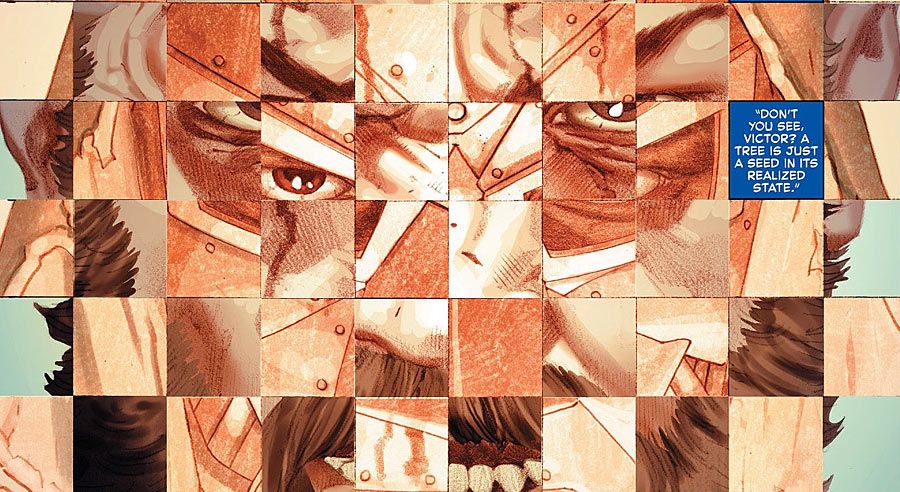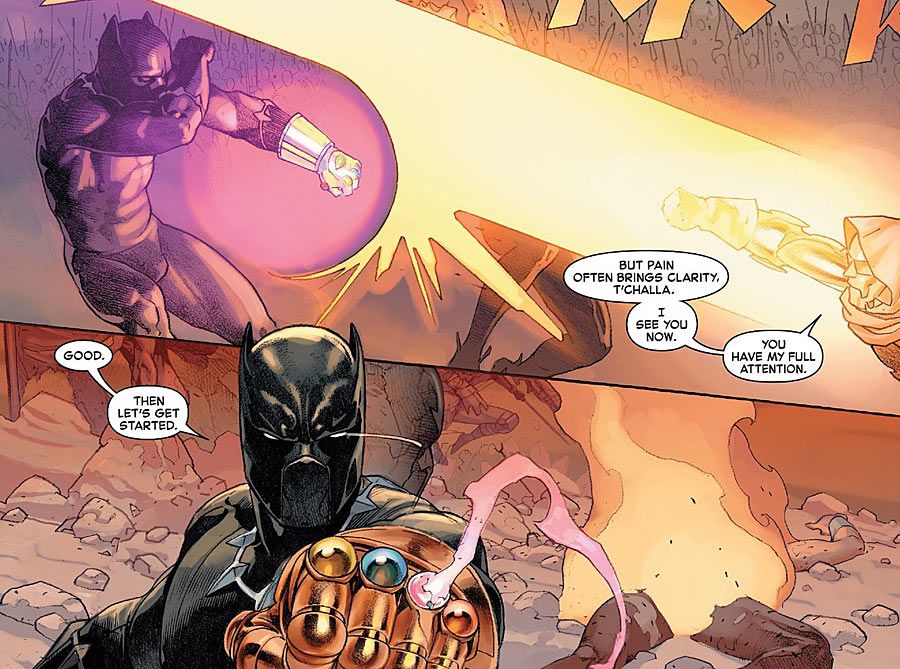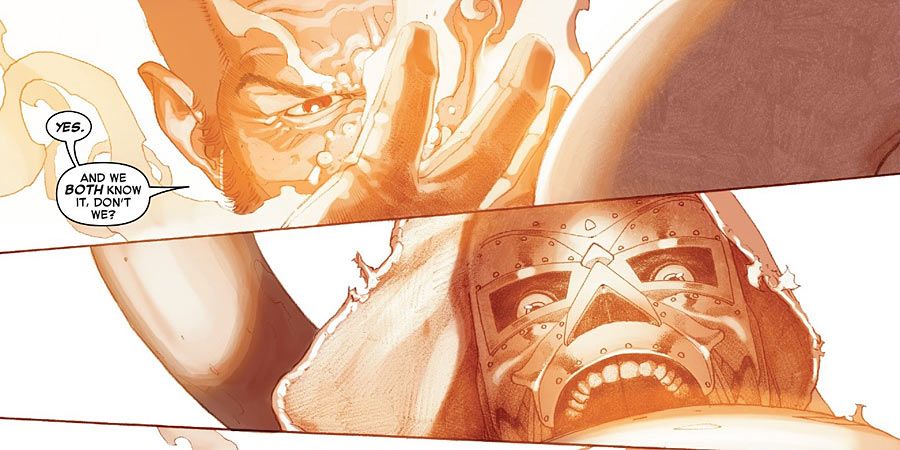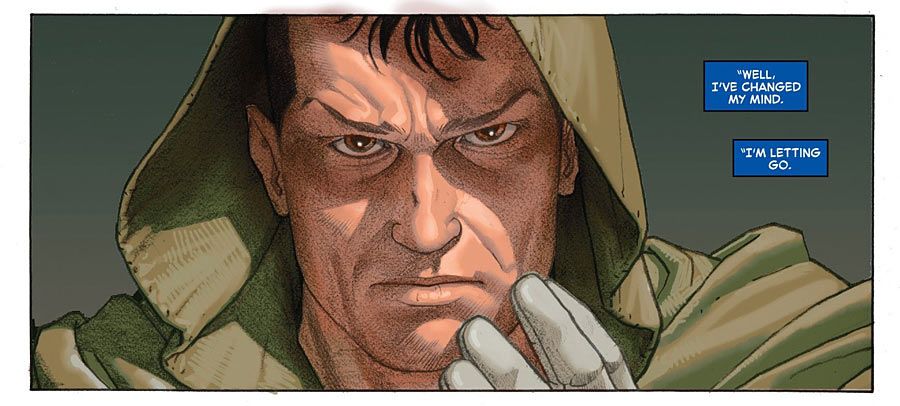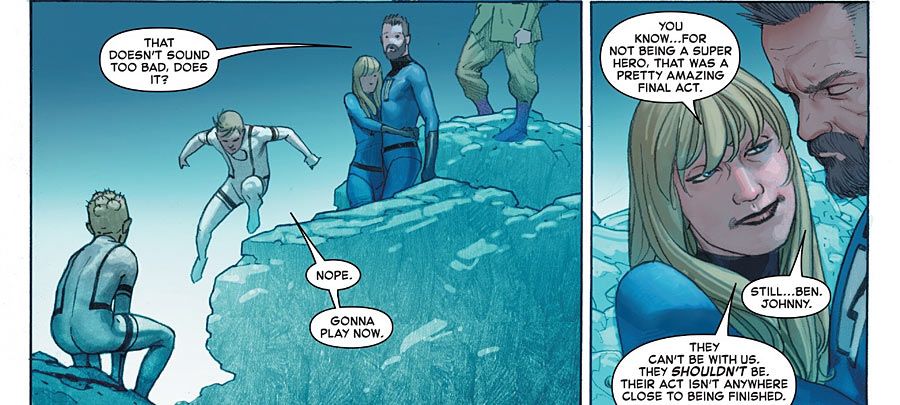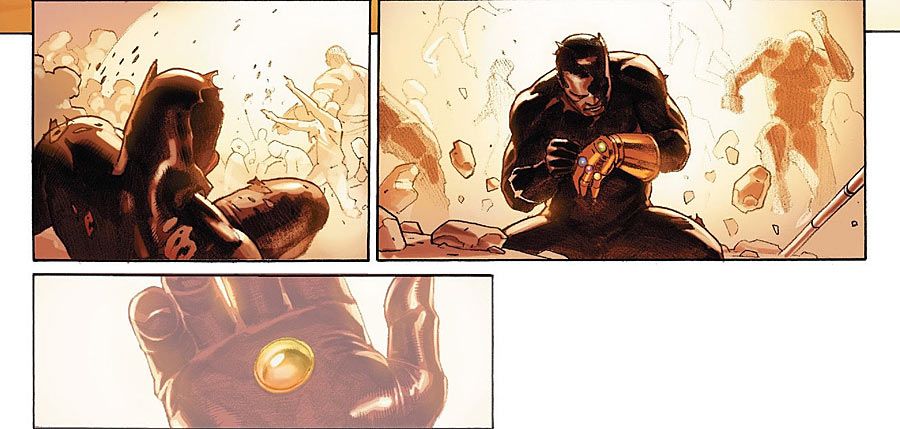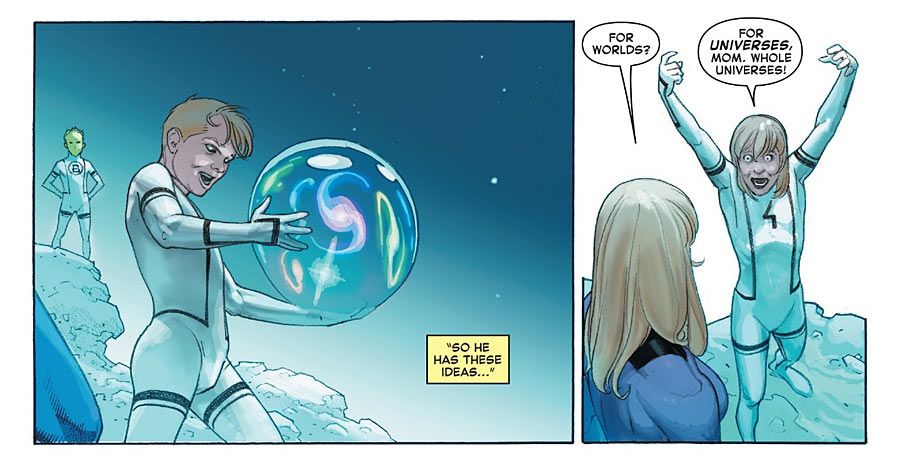SPOILER WARNING: The following interview contains major spoilers for Marvel's "Secret Wars" #9, on sale now.
While the All-New, All-Different Marvel Universe is now a few months old, it still holds many secrets. Chief among them: how was it born?
In "Secret Wars" #9, the final issue of writer Jonathan Hickman and artist Esad Ribic's universe-altering series, the answer to that question and many others, including what happened to Reed and Sue Richards and why Doctor Doom appears to have turned over a new leaf, have been revealed.
RELATED: "Secret Wars" #9 Finally Reveals the Fate of the Fantastic Four
With the long-awaited finale finally on sale, Hickman and Marvel Executive Editor and Senior Vice President of Publishing Tom Brevoort joined CBR News for a wide ranging post-game discussion about the issue and the series as a whole. The pair not only address the questions mentioned above, they also reveal the aspect of Issue #9 that led to it being sent to the printer at the last possible minute, and what projects Hickman plans to tackle next.
CBR News: I think we should start off by acknowledging the amazing job the team of artist Esad Ribic and colorist Ive Svorcina did on this final issue. There were a lot of great sequences, but I wanted to talk about two that I found very interesting, the first being the splash page mosaic made up of Doom and Reed Richards' faces. What inspired this page?
Jonathan Hickman: I thought it would be cool, which at the end of the day is a fairly valid reason for doing certain things in comics. As usual, Esad took the idea and ran with it. He made it about 50 times better than it would have been normally. So, as usual, all praise to Esad!
Tom Brevoort: As is typical for Jon, realizing that we were at the last issue, time was at a premium, and Esad was having to work extremely fast under a very difficult deadline, he thought, "What would be the best way to make a page as complicated and difficult to pull off as possible, but look really cool when it's done? Let's do that!" [Laughs]
Hickman: [Laughs] Yeah, I was my normal, considerate self.
I really liked how Ive gave the characters colors that matched their temperament on this page.
Hickman: Yeah, it's a really well done page.
Brevoort: It was important that the color palette on that page in particular helped to separate the two overlapping faces, but for them to also blend together as you move in towards the center of it. I think it was a tricky thing for Ive to pull off.
The other art sequence is the pages that depict the battle between Doom and the Black Panther. Jonathan, how much direction did you give Esad on these pages? Were these specific scenes you laid out, or was this all his imagination?
Hickman: I gave him what I thought should be happening; the visuals as I thought they should be. The point, though, was that they should be a bit abstract, a bit out there, because it was basically two guys fighting who could meld reality into whatever they wanted it to be. I thought Esad did a really good job on that, as usual.
Brevoort: I think it's going to be hard for people to believe this, given that the final books are coming out so late, but Esad had what only could be described as a crippling deadline on this last issue to make sure it would come out when it was supposed to come out, and he and Ive both completely rose to the challenge. They turned this issue out in pretty much the same amount of time that it took between Issue #8 and #9 to come out. So if you can remember where you were when you bought Issue #8 and assume that's when he started on this, that's about how much time it took to do this issue -- and this is a big 35-page issue. So it's not even like doing a regular book. It's like doing a book and half, probably a little bit more. So at the end here, he really had to sprint, and he did.
He didn't cut any corners, either. You can't find pages that look weak or like he checked out on them. He really hit this super hard and super good all the way to the end. It's a great piece of work.
Hickman: Yep. And if we're being completely fair, any volume of praise about my writing on "Secret Wars" should absolutely be dwarfed by that regarding the art work of Esad and Ive. I think it's the best looking event book that Marvel may have ever done. It's amazingly good work. Just fantastic.

And speaking of all credit being due, I've been working with Esad off and on since 2011 when we started doing "Ultimates." And in between he's also done some amazing work on other books, most notably with Jason Aaron on the "Thor" series. So I looked and I was kind of shocked to see that, in that time, he hasn't even been nominated for an Eisner. We should do something about that, as I think it's time for Esad to get that kind of recognition. It's certainly something he deserves.
Anyway, I think he's wonderful and one of the best in the business. I could talk about him all day long.
RELATED: "Secret Wars" #9 Defines Miles Morales' Post-Ultimate Universe Status Quo
After the mosaic page we talked about we got a defining moment in the rivalry between Doom and Reed where Doom admits to Reed that he thinks Reed would have done a better job than him as "God." What did it cost Doom to admit this? And, Tom, to your knowledge and recall has Doom ever confessed something like this before?
Brevoort: I don't know that we've ever seen Doom confess something like this before, specifically. You might be able to find a story somewhere, though. I'm sure somebody will prove me wrong in the comments, but that's a fairly big admission from Doom, and ultimately, it cost him everything here. It's a big admission both figuratively and literally.
From the issue's final pages, it looks as though it was a sort of freeing admission for Doom as well.
Hickman: Yeah, I think so. People are free to interpret the story however they want to, but I think you could argue that Doom was, at times, the most heroic person in the story, and I think you could argue at the end that he won just as much as anybody else. That's one of the neat things about the story.
Brevoort: I think, too, and I've said this a couple of times over the weeks and months since the all-new, all-different Marvel Now books have been coming out, that "Secret Wars" #9 was pretty much unspoilable. This is a very good example of that.
That last page of #9 lands. It has great impact, despite the fact that Doom has been walking around in "Invincible Iron Man" for five issues with his face healed and looking perfectly normal. On the one hand, everybody going into this had to know something was going to happen and Doom was going to get his face fixed, but by the same token, I think you read the story, you get caught up in what's going on and you don't even think about it. Then, when you get to that last page, it still feels like a surprise. It still feels like a revelation, even though you've already seen it.
Doom's confession leads to the status quo of the new Marvel Universe, which appears to be a multiverse that's growing more and more each day thanks to the Molecule Man, Reed and his son Franklin.
Brevoort: It's effectively a new multiverse. The biggest and most important thing here that nobody in the world will like, and that I'm the only one that keeps poking at, is the fact that the Marvel Universe is no longer the 616. I don't know if by the end of "Secret Wars" #9 there are 616 universes yet. There will be an infinite number of them. Realities that we've known and new ones that we've never visited before are being constantly created, and then mapped and explored by Reed and his family.
They started by restoring the Marvel Universe. So really, it's now the Prime Universe.
Stories change and grow as you're developing them, but I'm curious about this ending. Was this always going to be the fate of Doom, Reed, Sue and the kids in the Future Foundation? Or is this something that developed over time?
Hickman: There are things that have not changed since the beginning of me working on this stuff, and I think those bits are kind of obvious. The thing that organically happened, which worked to our benefit, was the fact that it was advantageous to be writing what was essentially the last Fantastic Four story.
I remember the summit where this became kind of the obvious thing, and I asked Mark Waid, "Are you cool with me doing things this way?" And he was. I had Mark's blessing, which was important to me. We kind of agreed on how it should be handled. All that happened early enough that it was actually going to make it more powerful, and as far as I can recall, that's kind of the only thing that changed, even though it ended up being a really big thing.
Tom, am I remembering that right?
Brevoort: I think so. At a certain point, we set out here to do the last Fantastic Four story, at least for the time being. We didn't necessarily start with that as the original goal way back even with "Avengers" #1. That having been said, it's such a natural end point because a lot of this stuff organically grows out of Jonathan's "Fantastic Four" run. It seems like a fitting capstone to all of that.
Getting back to the "Secret Wars" #9 is unspoilable of it all, despite the fact that people have been walking around going, "Oh yeah, Reed dies. They all die in 'Secret Wars.'" In point of fact, none of those characters are dead. So once again, you thought you knew what was going to happen, but you didn't! Unspoilable.
Hickman: Yeah, and that was a conversation in the room. Something that was absolutely talked about was should they die? I had absolutely zero interest in telling that story. [Laughs] Because it runs completely contrary to everything that I feel about that franchise and everything that I feel about those characters. So we got to where we wanted to get to.
RELATED: Hickman Sets the Stage for "Secret Wars'" Finale
My perhaps overly meta take on the ending is that the family that led to the birth of the original Marvel Universe is now helping shape the new Marvel Universe.
Brevoort: I think that's a fair observation.
Hickman: It's not wrong. [Laughs] It's pretty dead on, actually.
Now, there are some people who will look at this ending and all they'll see is Marvel putting Reed, Sue, Franklin and these other characters on a shelf because of movie rights. Is that fair? Is this really a shelf?
Brevoort: It's a shelf in that the Fantastic Four as a unit are now split up. Ben and Johnny are in "Guardians," "Inhumans" and "Uncanny Avengers," and there isn't a "Fantastic Four" title. None of these characters are dead, though. Therefore, the future will inevitably and invariably get to a point where we'll see more of Reed, Sue, Franklin, Val, Dragon Man and the Future Foundation. We will get to that point. I don't know that we'll get to it quickly. Maybe we will. Maybe we won't. Hopefully we'll get to it when you least expect it so their reappearance on the Marvel stage can have some resonance to it.
I would read a book with the status quo of those characters making and exploring universes.
Brevoort: And potentially, maybe we will do such a book. We shall see.
Hickman: I don't think there's anything negative about the ending at all. I think at the end of the day, the idea of one of the best franchises that Marvel has never appearing again is ridiculous. Why would you not want more of that at some point?
Brevoort: That said, and this is another conversation we've had in retreats and elsewhere, and I think we've even talked about it if not in these "Secret Wars" chats, then in other recent chats about previous event books. "Fantastic Four" has been one of those books that, for a number of years, has been effectively taken for granted. It's been considered stodgy, or old school, or some people see it as a thing that's there and people are comfortable because it's there, but they're not particularly passionate about it.
So we're not going to have that book for a while. We didn't have a Thor book for a while. We did "Avengers Disassembled" and Thor went away. For a couple of years, there was absolutely no Thor book, and when Thor came back, it was a huge book. It continues to be a huge book to this day. I think that absence was part of what made people cherish its return, and then it was just having great talent to execute that return. If the same sort of thing happens with Fantastic Four that would not be the worst thing in the world.
Let's back up a bit and talk about what exactly the Black Panther did near the end of the story. Was that the Time Gem he used there near the end?
Hickman: Maybe...
Brevoort: [Laughs]
Hickman: Did we ever agree on that, Tom? Did we ever come down on whether it was the Time Gem or the Reality Gem?
Brevoort: Boy, we went back and forth on that right up until the end. I think it was the Time Gem, but it's been a while now, and it was so last minute. You and I were chatting at 7:30 that night as the book was getting done going, "What color is the gem? It's this color now, but it has to be that color! What color does it have to be? Because it's got to work this way or that way."
I remember, we went back and forth between it being the Time Gem or the Reality Gem.
Hickman: It was colored wrong. It was colored green. And you called me up, and -- I won't say you were freaking out, but you were not happy. [Laughs]
Brevoort: [Laughs] It was late on a Friday! I wanted to be done with this!
Hickman: I actually went in and tweaked the color and changed it. Then we had a debate about whether or not it should the Time or the Reality Gem, because both of them work in terms of where we were going with the story and what it actually means.
The point of it, though, was to get T'Challa back to where he was in "New Avengers" #1, so he could act as an advocate for doing things a better way. To carry the weight of it.
You guys touched upon the final experience of putting this last issue of "Secret Wars" to bed, but how did it feel to send this issue off and conclude this collaboration that both of you have been working on for years?
Hickman: Well, Tom finally got his chance to fire me, and did so.
Brevoort: [Laughs] It was brutal.
Hickman: I've never heard him happier than at that moment. [Laughs]
Brevoort: [Laughs]
Hickman: No, it was good. It was very appropriate that we were getting the book out super late on that last night. [Laughs]
Brevoort: It was certainly a relief, but it was the bad kind of relief. [Laughs] It wasn't the, "Hey! We're triumphant! Let's celebrate that we just did this!" It's more, "We just boxed 15 rounds and now we're dragging ourselves back to the locker room and then home to collapse and recover."

We went right up to the wire and maybe a little over the wire getting it done.
Hickman: Yes! It's a lot like if you've ever seen one of those people finish a marathon and then they collapse and lose all control of their body. [Laughs]
Brevoort: I want to thank everybody for sticking with us, especially during our "programming delays." Hopefully the climax here was worth the wait, and people will have gotten their money's worth and feel like the ride was worth it.
We also want to thank not only the creative team of "Secret Wars"-proper, but all the creative teams for all the crazy tie-in books that we did. In particular, the teams who were on regular Marvel Universe books who had to kind of stop their books and do something else for three or four months while we blew up literally everything and mashed it all into a big crazy meatball.
Hopefully the work was good, people enjoyed it, and will continue to enjoy it.
Hickman: Yes, all of that of course. I'll just add that it's kind of rare as a creative person for a company like Marvel to let you do what you want to do for six or seven years because they get what you're going for. I'm pretty grateful to have had that level of trust.
As a writer, I've been overwhelmed that I got to play on a playground as big as this was. I know not a lot of people get to do it, and while I'm generally happy with a bunch of the stuff I've done for Marvel, I'm very happy with how we ended. I'm proud of how "Secret Wars" came out, and I think it was a cool experiment that turned out to be a little bit of a success.
We do, of course, regret the delays. [Laughs]
Brevoort: [Laughs] Yes, we were entirely too optimistic at every stage. [Laughs] We've learned nothing in 75 years of making comics -- nothing at all.
Finally, Jonathan, I understand the only thing left to be released from your initial stint at Marvel is the remaining issues of "SHIELD."
Hickman: Yeah, I have to turn in those script passes. I'll probably do those in the next couple of weeks, now that all of this is locked down. I'm not exactly sure what I'm doing next. I'll figure something out. Tom and I have talked about some stuff -- it's definitely not "Secret Wars II."
Brevoort: [Laughs] I might have an idea for something. We'll talk later. I might or I might not, because you may hear this and go, "Oh, no! I don't want to do that!" [Laughs]
So as far as definite projects for you in the immediate future, it's just creator-owned books?
Hickman: Yeah, I have a bunch of stuff that I'm doing at Image. The biggest thing is that I'm going to write and draw a book again, which I've really missed doing. All of that will get announced pretty shortly, here.
Marvel has been really good to me, and I've had a good time working with them. If I can manage my work schedule, I would absolutely love to continue to do more books with them. And I'm happy, which is nice.
For Marvel readers who have yet to try your creator-owned work, is there a book you recommend they start with?
Brevoort: Jonathan doesn't do good starting points. If you've been paying attention, you know that's not his bag, man.
Hickman: [Laughs] I think the way we like to sell this stuff is to say that it all ties in together, so if you would like to continue reading the amazing stuff you read here at Marvel, you can buy "East of West." How about that?
Brevoort: [Laughs] Right! That's on the other side of Battleworld; the back side.
Hickman: [Laughs] Yes! The underbelly, as it were.
"Secret Wars" #9 is on sale now from Marvel Comics.

